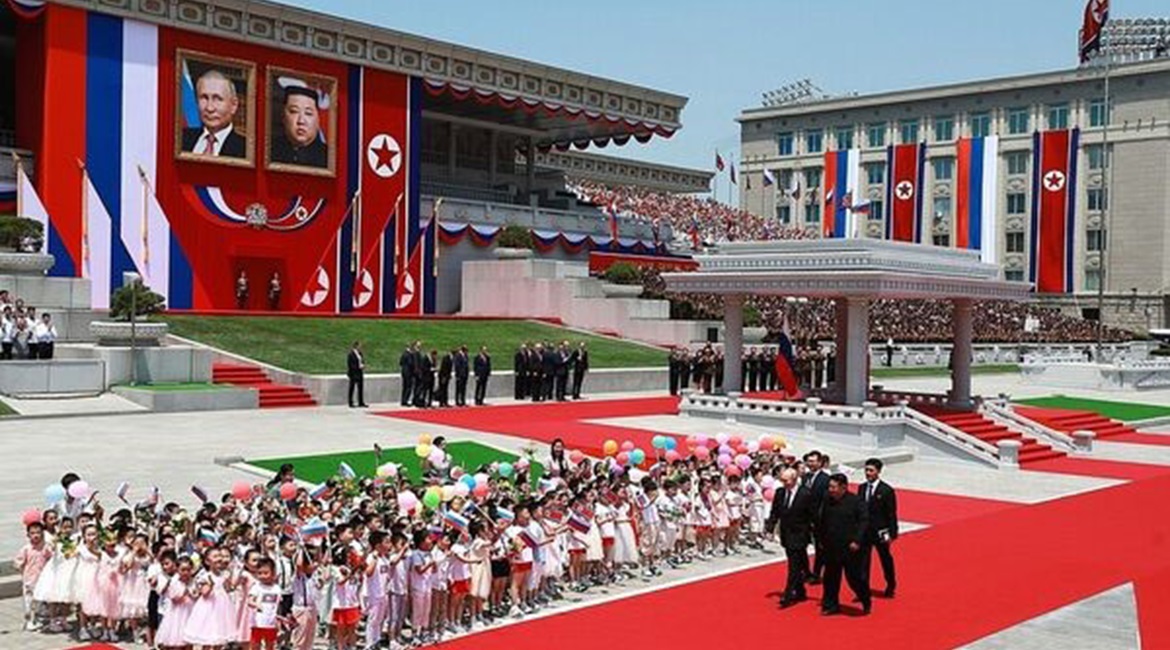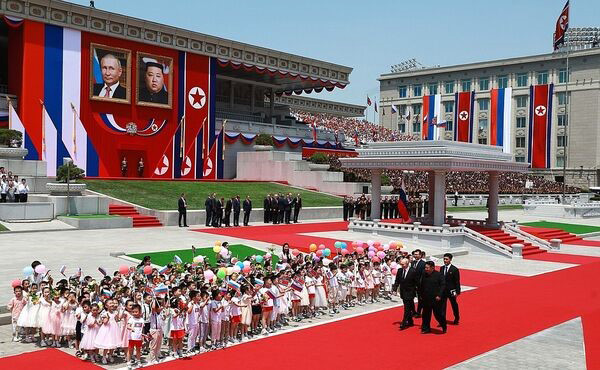
Date Posted: 25-Jun-2024
Key points
- Event: During 18–19 June Russian President Vladimir Putin and North Korean leader Kim Jong-un signed three agreements, including the non-expiring Treaty on the Comprehensive Strategic Partnership between the two countries
- Significance: Key commitments include measures counter-acting sanctions; labour migration; food and energy security; military, science, and technical co-operation; as well as logistics
- Outlook: Russia's military-technical support for North Korea is very likely both a long-term plan – to strengthen Pyongyang as an ally against the influence of Japan and the US – and a short-term symmetrical response to counter-act the 2024 US-Ukraine Bilateral Security Agreement and Seoul's possible weapons shipments to Kyiv
Event
During 18–19 June Russian President Vladimir Putin and North Korean leader Kim Jong-un signed three agreements: the Treaty on the Comprehensive Strategic Partnership between the Democratic People's Republic of Korea (DPRK) and the Russian Federation, an agreement on the construction of a cross-border road bridge across Tumen (Tumannaya) River, and an agreement on co-operation in healthcare, medical education, and science.

State visit of Russian President Vladimir Putin to North Korea, 18–19 June 2024. (Kremlin.ru)
The composition of the Russian delegation reflected the breadth of issues discussed. Moscow's delegation included two deputy prime ministers – Denis Manturov and Alexander Novak, Minister of Foreign Affairs Sergei Lavrov, Minister of Defence Andrei Belousov and Deputy Minister of Defence Alexey Krivoruchko, Minister of Natural Resources Alexander Kozlov, and Minister of Transport Roman Starovoyt. Yuri Borisov, the director general of Roscosmos, and Oleg Belozerov, the CEO of Russian Railways, also attended.
Key commitments under the Treaty on the Comprehensive Strategic Partnership included anti-sanctions measures; labour migration; food and energy security; co-operation in military, science, and technical fields; and logistics.
Article 16 in the strategic partnership treaty opposes “the use of unilateral coercive measures”, that is sanctions, and calls on two signatories to guarantee that “coercive measures” are not applied, including those related to “work and services”. For Russia, an increase in North Korean labour migration is of great interest given the country's record-low unemployment rate of 2.6% in April 2024, according to Reuters. Labour shortages are particularly acute in Russia's sparsely populated Far Eastern Federal District, including Primorsky Krai – а territory with only 1.8 million inhabitants, which borders North Korea.
Article 9 states that the two signatories will jointly act “against threats to food and energy security”, while Article 12 calls for intensifying agricultural co-operation. This is very likely driven by United Nations Security Council (UNSC) sanctions limiting North Korean imports of refined petroleum at 500,000 barrels per year and imports of heavy machinery (including agricultural). Conversely, Russia is facing grain surpluses after the sanctions against its agricultural exporters following the 2022 Ukraine invasion. Russia is also interested in diversifying its export markets, as its largest export markets in 2023 were Egypt, Iran, Saudi Arabia, and Türkiye, according to US Department of Agriculture data, with very few buyers in the Asian markets.
The treaty's Article 10 mandates both countries “to expand and develop co-operation in science and technology”, while Article 3 stipulates that “countries will co-operate to ensure lasting regional and international peace and security” and speaks of “practical measures needed to eliminate threats, should they arise”. At a post-visit press conference on 20 June Putin added, in what is very likely a symmetrical response to actions by NATO countries in Ukraine, that he “doesn't exclude the possibility of supplying high-precision weapons to North Korea” and noted that “in the future Russia may, following the example of Western countries supplying weapons to Ukraine, declare that it does not control the further use of these weapons”. Russia had in the past had a working trade relationship with South Korea but since the February 2022 Ukraine invasion, Seoul had joined the Western sanctions and agreed to supply the US with ammunition shells, enabling the US to supply its own stocks to Ukraine. In June Putin twice stated that “if South Korea were to supply Ukraine with weapons”, that “would be a mistake”, and that “Russia's response will not be to Seoul's liking”.
Outlook
Russia's changed stance and willingness to circumvent UNSC sanctions against North Korea very likely indicate that Moscow is continuing to forgo old international commitments in favour of its current national interests. Returning to the framework of the Treaty of Friendship, Cooperation and Mutual Assistance of 1961 between the Soviet Union and North Korea, invoked by Putin on 20 June, and with Moscow's diplomatic efforts in 2024 with Afghanistan, China, Cuba, Iran, Saudi Arabia, Venezuela, and Vietnam, it is very likely that in the coming six to 24 months Russia plans to expand its ambitions beyond a narrow focus on Europe and Ukraine, and concentrate on establishing new partnerships with developing countries and re-establishing some Soviet Union-era relationships.
Janes assesses that mutual economic interest will almost certainly drive Russia in the short- to mid-term to strongly increase North Korean labour migration, with Primorsky Krai region a priority destination. Regarding food security, Janes assesses that in the short-to-medium term, Russia will almost certainly commit to providing North Korea with any food imports required. Putin's 20 June statement comparing the UNSC's restrictions against North Korean agricultural sector with “Germany's starvation blockade of St Petersburg during World War 2”, and further questioning “whether sanctions on labour migration are humane” indicate the likelihood of this assessment. There is also a roughly even chance that Russia will begin developing a Far Eastern Federal District grain export hub in the mid-term in Vladivostok.
Russia's support for North Korea with military-technical co-operation under this non-expiring treaty is very likely both a long-term plan to strengthen Pyongyang as an ally against the influence of Japan and the US in Northeast Asia and a short-term symmetrical response to counter-act the 10-year US-Ukraine Bilateral Security Agreement of June 2024. The measure is also likely anticipating any possible future weapons shipments by Seoul to Kyiv. Further indications of this were the presence of Russian defence and deputy defence ministers, and the CEO of Roscosmos – a state corporation in charge of Russian space, rocket, and satellite industries.
The agreement on the construction of a cross-border bridge, alongside the presence of transport and natural resources ministers and the CEO of Russian Railways corporation, indicates the long-term prospects for this evolving bilateral relationship. The infrastructure and logistics investments are in line with Putin's remark, during Kim's September 2023 visit to Russia, that a “cross-border logistics triangle could be built”. As the planned bridge will lay downstream from the Russia-China-North Korea tri-border, and as its construction and designed height could impact Chinese shipping, Beijing will almost certainly be consulted regarding its potential future plans on possible new river access from China's inland Manchuria to the Sea of Japan (East Sea), which would very likely have security implications for Japan.
(Note: Items from news/wire services are abstracted from the originals and are not verbatim)


